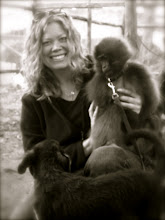While traveling home from Bahar Dar recently I came across a horrendous site—a crumpled truck and 6 dead cows. All of the men in the village had turned out. While the young men were rapidly butchering to salvage what meat they could, the elders were holding an impromptu court of arbitration to determine the driver’s penalty and the farmer’s compensation. An accident such as this one is devastating for both parties.
There are those, however, who have recognized and capitalized on the benefits of the asphalt conduit…namely busload after busload of potential customers. Each little town along the route specializes in something. Roadside in Dembecha one can find cowhide stools, Finote Selam sugar cane, south of Injebara horse tail fly swatters (otherwise knows as the Chera), North of Injebara charcoal, and between Emanel and DebreMarkos the local spirit (Arake) sold in repurposed Whitehorse liquor bottles. The season also influences the roadside market. At this time of year, kids stand roadside waving bags full of lemons (the entire bag of 12-15 lemons for 1 birr which is less than 10cents) and roasted field corn. It’s a veritable Wal-Mart, just one that is stretched out over the course of a couple hundred kilometers.
Initially, I didn’t get in on the buying frenzy. Instead I would get frustrated as to the delays that would result when the bus or mini-bus would pull over for yet another passenger to purchase something. I realized, however, that the best way to curb my frustration was to join in the fun. Now, whether I’m in a big bus or a private vehicle, I happily shop my way home and in turn support small business at a true grassroots level.
 I’m not a big fan of chawing down on raw sugar cane, but Tambarat (Gigi’s husband) is. He can’t get enough of the red sugar cane that grows near Finote Selam and I’m more than happy to pick him up a bundle whenever I’m passing through. I have to laugh, though, because I now shop like an Ethiopian. When this group of boys raced to the car, I inspected what they had in hand, turned up my nose, and then told them I wanted a fresh piece cut “tulu, tulu” (quickly, quickly). I have most definitely adapted!
I’m not a big fan of chawing down on raw sugar cane, but Tambarat (Gigi’s husband) is. He can’t get enough of the red sugar cane that grows near Finote Selam and I’m more than happy to pick him up a bundle whenever I’m passing through. I have to laugh, though, because I now shop like an Ethiopian. When this group of boys raced to the car, I inspected what they had in hand, turned up my nose, and then told them I wanted a fresh piece cut “tulu, tulu” (quickly, quickly). I have most definitely adapted!


